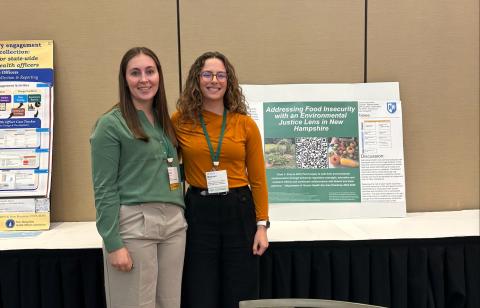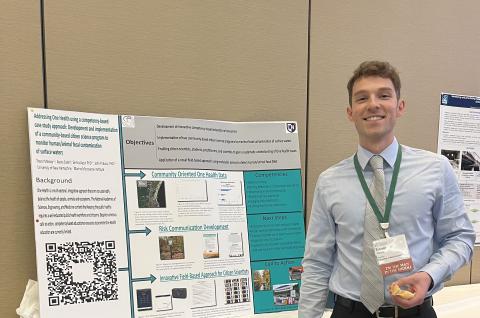UNH MPH Students Shine with Award-Winning Research
UNH Master of Public Health students showcased their expertise and represented the university proudly at the recent New Hampshire Environmental Health Conference, presenting research posters that addressed critical public health challenges. Madison Bailey ’25G and Jenna Finnerty ’25G earned the Graduate Student Poster Award for their project, "Addressing Food Insecurity with an Environmental Justice Lens in New Hampshire," while Trevor Massey ’25G shared his work on the One Health collaborative approach. The students’ research was also featured at the American Public Health Association annual meeting in Minneapolis.

Madison Bailey and Jenna Finnerty
What did you find interesting about this research?
Finnerty: It explores food insecurity through an environmental justice lens, using New Hampshire as a case study. We were inspired by the Fresno Food to Share program (which takes locally grown food and healthy donated food to community residents in low-income food desert areas). We examined how similar initiatives could be applied locally while considering the environmental and health aspects of food insecurity.
Bailey: Something surprising in the research is that a lot of the available data isn’t connected to health outcomes, which is what we were most interested in learning as MPH students.
What did you enjoy about this process?
Finnerty: This was the first time either of us had created a research poster, so it was definitely a learning experience. We used MIT's "better poster design" approach, which focuses on fewer words, more visuals, QR codes, and larger titles. It really grabbed people’s attention, and we received a lot of positive feedback from attendees who weren’t used to seeing this type of design.
Bailey: The topic itself is something that people don’t research often, and I think that made it stand out. People at the conference appreciated it, and that contributed to the recognition we received.
How will this project help you in the future?
Finnerty: We have a field study project coming up in the spring, which will also require a poster presentation. This experience was a great trial run—it gave us a sense of the research and presentation process, which we’ll build on for that.
Bailey: The process of conducting a literature review, designing a poster, and presenting at a conference is an invaluable experience. It’s the same framework we’ll use in future public health projects.
How is the UNH MPH Program preparing you for what’s next?
Bailey: An advanced degree is essential to work in public health and be involved in leadership and change-making. I’m interested in infection prevention and working in a clinical or hospital setting, aiding healthcare providers in preventing infections and improving patient health outcomes.
Finnerty: I’m interested in infection prevention as well, but I’m also exploring the broader scope of public health through different experiences. This research allowed me to focus on the environmental side, while my internship with community centers and teaching an undergraduate lab class have provided other perspectives. I’m still figuring out exactly what I want to do, but gaining a variety of experiences and dipping my toes in different areas has been incredibly helpful.

Trevor Massey
What was your research about?
I developed a competency-based educational resource focused on a community-based citizen science project that monitors fecal contamination in surface waters. Using molecular assays to detect human and animal fecal DNA, this project provides a sustainable, field-based method for identifying surface water contamination. It offers communities a rapid tool for water quality monitoring and contributes to environmental literacy by promoting systems thinking, collaboration, and a One Health approach to public health.
What made you interested in this research area?
Growing up in New Hampshire, I've always been inspired to research beach water quality and its impact on health. However, it wasn't until I had the guidance of mentors like Dr. Semra Aytur and Dr. John Bucci that I realized I could make a meaningful difference in the community through my own research.
How does participating in a project like this align with your future studies or career goals?
This research has shown me the value of community-based work and the role of community scientists. I've gained a range of practical skills and had the chance to collaborate with many great people. Whether or not I continue with beach water quality, this experience has helped me build strong communication, project management, and real-world skills.
As I finish the UNH MPH program, I often reflect on what I will bring to the real-world afterwards. The one thing I preach is the amazing connections and people I have met throughout the process. I have been able to exercise my skills in presentations, educating others, and managing individual projects all with the help of my professors along the way.